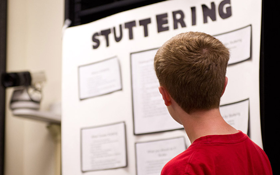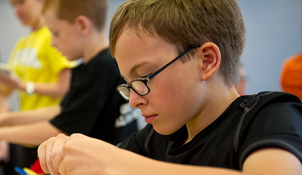Fluency and Fun: UI SPEAKS Helps Kids Who Stutter


In a sunny, second-story room at the Wendell Johnson Speech & Hearing Clinic, six kids perch on brightly colored chairs arranged in a circle. Beside each child sits his or her personal speech coach for the week, so designated by her badge. There is some fidgeting, some excited chatter, before one of the coaches asks, “So who wants to lead the group today?” A boy in a blue shirt shoots up a hand, and the clinician hands him an index card. “Question number one!” he reads aloud, tripping a little over the n, “What have you learned from camp so far?”
It has only been one day, but the children—many of whom take pains to avoid being called on at school—are eager to answer. As the boy in blue calls their names, they respond: “That it’s OK to stutter.” “Just because you stutter doesn’t mean you’re not normal.” “If you practice, you’ll become more fluent.” “To be determined!” “If people make fun of you, you can ignore them because they don’t understand, but you understand.” Of course the answers don’t come quite as effortlessly as this: there are hesitations, pauses, repetitions of words and syllables, to which the speech coaches respond with small words of encouragement, like “easy” or “focus.” And yet the others do not become impatient or interrupt, or worse, laugh. They know what it’s like to stutter; they wait. They listen.
 The kids are participants in the UI SPEAKS week-long stuttering camp hosted each summer by the Department of Communication Sciences & Disorders in the College of Liberal Arts & Sciences. Because there is no known cure for stuttering—a condition experienced by some 3 million Americans—the goal of the program is to offer a safe and supportive place where children aged eight to twelve can learn strategies to increase their speech fluency, practice their speech, meet other children who stutter, and learn to talk openly about the problem. “We help to demystify it,” explains Toni Cilek, director of the camp and a clinical associate professor in the Department. Cilek established the program in 2006 with the recognition that early intervention is important in the successful management of stuttering, emotionally as well as linguistically. “We want the kids to learn to accept their stuttering, but we also want them to try to improve it,” she says, noting that for many people—especially children—stuttering, untreated, can be a source of anxiety, fear, anger, and shame. The summer, she says, is a good time for the kids to do intensive practice and to focus without the distractions of school.
The kids are participants in the UI SPEAKS week-long stuttering camp hosted each summer by the Department of Communication Sciences & Disorders in the College of Liberal Arts & Sciences. Because there is no known cure for stuttering—a condition experienced by some 3 million Americans—the goal of the program is to offer a safe and supportive place where children aged eight to twelve can learn strategies to increase their speech fluency, practice their speech, meet other children who stutter, and learn to talk openly about the problem. “We help to demystify it,” explains Toni Cilek, director of the camp and a clinical associate professor in the Department. Cilek established the program in 2006 with the recognition that early intervention is important in the successful management of stuttering, emotionally as well as linguistically. “We want the kids to learn to accept their stuttering, but we also want them to try to improve it,” she says, noting that for many people—especially children—stuttering, untreated, can be a source of anxiety, fear, anger, and shame. The summer, she says, is a good time for the kids to do intensive practice and to focus without the distractions of school.
Twelve children from across Iowa and the neighboring states participated in this year’s camp, held at the Wendell Johnson Speech & Hearing Clinic the week of June 4, with four additional follow-up sessions throughout the summer. Most were referred to the program by the speech pathologists at their schools.
On the first day of camp, the kids are paired with a personal speech coach—a graduate student clinician in the Department, supervised by certified and licensed speech pathologists—who works with them on speaking strategies, accompanies them to group counseling, and joins them for practice activities, for a total of 50 contact hours over 9 days (compared with the 20-30 minutes of speech therapy per week most of them receive at school). The children’s families, meanwhile—usually one or both of their parents—meet with the clinicians and attend group sessions with other parents, where they share experiences, swap resources, and discuss ways to support their children’s efforts.
 “As a parent, it’s hard,” says Michelea Mikels, from Centerville, Iowa, “because you want to do everything you can to help, but [fluency] isn’t something you know how to teach.” She’s been bringing her eight-year-old daughter, Emily, to the clinic for speech therapy with Dr. Cilek since the fall of 2011, but this is their first year at UI SPEAKS. “About a month ago,” Michelea recalls, “Emily’s stuttering got really bad, to where she could barely even talk and missed a couple of days of school. She told me her tummy hurt, but it turned out she just felt terrible about herself. ‘I can’t talk,’ she’d say. ‘I just can’t get it out.’” At camp, Emily and her speech coach, Lauren, work to build self-esteem and fluency through “easy relaxed speech,” a technique Emily explains as “when you slooow down and…you…talk…like…this.”
“As a parent, it’s hard,” says Michelea Mikels, from Centerville, Iowa, “because you want to do everything you can to help, but [fluency] isn’t something you know how to teach.” She’s been bringing her eight-year-old daughter, Emily, to the clinic for speech therapy with Dr. Cilek since the fall of 2011, but this is their first year at UI SPEAKS. “About a month ago,” Michelea recalls, “Emily’s stuttering got really bad, to where she could barely even talk and missed a couple of days of school. She told me her tummy hurt, but it turned out she just felt terrible about herself. ‘I can’t talk,’ she’d say. ‘I just can’t get it out.’” At camp, Emily and her speech coach, Lauren, work to build self-esteem and fluency through “easy relaxed speech,” a technique Emily explains as “when you slooow down and…you…talk…like…this.”
The camp is especially important for kids from rural and small school districts, like Emily’s, where there may be only one or two children who stutter. As Cilek observes, “It’s really empowering for them to meet other kids who stutter.” Plus, says Tina Rukgaber, mother of ten-year-old Jason of Ottumwa, Iowa, “For some, there are fewer resources for stuttering at the local level.” Jason has attended UI SPEAKS for the past three summers and has made enormous strides in terms of both his stuttering and his self-image. “He’s just so much more comfortable in the skin that he’s in,” says Tina. For his part, Jason loves coming to camp: “I really like it here. We practice our speech a lot, and we talk about what our new strategies are, and we talk about things that happen at school, like when people call us names. We get to make new friends every time we come here!”
Between individual speech therapy and group counseling sessions, the campers do “generalization and transfer” activities, in which they practice speaking in real-world contexts, such as talking on the phone and giving short presentations—activities that, says Cilek, kids who stutter tend to shy away from doing. “Sometimes we’ll have them go out into the community with their speech coaches and do things like order their own ice cream and ask store clerks for directions.” And of course, every day, there’s a just-plain-fun activity, like tie-dying shirts, tossing water balloons, and making recycled art. (Jason is partial to the water balloons; Emily likes making bracelets.)
The College’s Department of Communication Sciences and Disorders—home of the nation’s first speech pathology program—has a longstanding commitment to the study, assessment, and treatment of stuttering. It was here that Dr. Wendell Johnson pioneered a new, holistic approach to stuttering therapy in the 1950s. Whereas historical “cures” involved approaches such as surgical alteration of the tongue, Johnson insisted that stuttering was neither a physical nor a neurological problem. He advocated a therapy centered on stutterers’ thoughts, attitudes, beliefs, and awareness of behaviors—a therapy that privileged the patient-therapist relationship. Departmental clinicians continue to use a modified version of Johnson’s approach, getting to know their patients and their families, learning about their experiences with stuttering, and monitoring their attitudes toward it. Thanks in part to the success of this paradigm, the Department’s speech-language pathology and audiology graduate programs are consistently ranked as the first and second in the country.
This year’s campers were treated to a visit by Dick Smego, UI alumnus and former patient of Johnson’s, who shared the story of how he overcame his stuttering and became a successful businessman. Referred to the UI as a college freshman specifically to work with Johnson, Smego recalls, “We had people from all over the world coming in for help. The first night, 33 of us sat in a circle and went around saying our names and where we were from. It took us three and a half hours to get through it, because everyone stuttered so badly.” But, he says, through hard work with a personal speech coach, he and many others learned to manage their speech. “You don’t necessarily ‘conquer’ it,” he says, “You learn to control it.”
At the end of camp, the speech coaches will send reports to the children’s school speech pathologists with suggestions for ongoing therapy. “We have a really good working relationship with them,” notes Cilek. “They’re anxious to follow through with the strategies we’ve set up.”
 Many of the participating families find the UI SPEAKS camp so beneficial that they return year after year—though for many of them, it’s a costly investment. In addition to taking time off work, families must cover the $500 program fee (which itself doesn’t cover the camp’s costs), as well as lodging and travel expenses. Donations from the Old Capitol Sertoma Club and the UI’s Delta Center have provided a few scholarships, but Cilek would like to do more towards making the camp accessible to families who need it. In the coming years, she hopes to organize a fundraising campaign and increase the camp’s visibility through collaboration with local organizations and other UI departments. This year, for instance, she arranged for students from the School of Art and Art History’s Art Education program to come create plaster masks of each camper’s face that the kids then painted and decorated. “It was a great activity,” she says. “We’re planning to create a display here in the building as a reminder that stuttering has many faces.”
Many of the participating families find the UI SPEAKS camp so beneficial that they return year after year—though for many of them, it’s a costly investment. In addition to taking time off work, families must cover the $500 program fee (which itself doesn’t cover the camp’s costs), as well as lodging and travel expenses. Donations from the Old Capitol Sertoma Club and the UI’s Delta Center have provided a few scholarships, but Cilek would like to do more towards making the camp accessible to families who need it. In the coming years, she hopes to organize a fundraising campaign and increase the camp’s visibility through collaboration with local organizations and other UI departments. This year, for instance, she arranged for students from the School of Art and Art History’s Art Education program to come create plaster masks of each camper’s face that the kids then painted and decorated. “It was a great activity,” she says. “We’re planning to create a display here in the building as a reminder that stuttering has many faces.”
For more information about the UI SPEAKS stuttering camp or the Department’s other programs for teenagers and adults, contact Toni Cilek at toni-cilek@uiowa.edu. To make a donation to the camp, please contact Val Barnes at the UI Foundation, val-barnes@uiowa.edu.